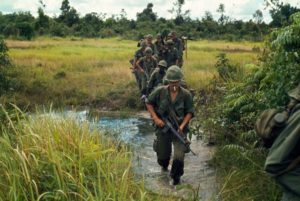By: Celeste E. Whittaker

Members of Company B, 1st Battalion, 27th Infantry Regiment (Wolfhounds), 25th Infantry Division, cross a stream approximately 15 kilometers southeast of Nui Ba Den during search and clear operations near Fire Support Base Kien during the Vietnam War. From the National Archives.
LOS ANGELES — Lesbian, gay and bisexual veterans who served in the Vietnam era reported more post-traumatic stress disorder and other mental health issues than their heterosexual counterparts, and a new analysis of data from a nationwide study survey questioned whether that was related to past trauma related to sexual identity.
The Vietnam Era Health Retrospective Observational Study (VE-HEROeS) survey analyzed data from more than 18,866 respondents from among 45,000 veterans and 11,000 matched controls invited to participate.
The conclusion of a recent study based on the survey was that, among Vietnam-era vets, post-traumatic events appeared related to sexual orientation and “contribute to LGB veterans’ greater prevalence of current probable PTSD and poorer mental [health-related quality of life] based on sexual orientation and contributed to LGB veterans’ greater prevalence of current PTSD and poorer mental [health] relative to heterosexual veterans.”
“This study is the first to document sexual orientation differences in trauma experiences, probable PTSD, and health-related quality of life in LGB veterans using a nationally representative sample,” explained lead author John Blosnich, PhD, MPH. Results were published in Psychological Trauma: Theory, Research, Practice, and Policy.1
Blosnich, an assistant professor in the Suzanne Dworak-Peck School of Social Work, University of Southern California, suggested to U.S. Medicine some of the factors that might have contributed to the higher rates of PTSD in LGB veterans.
“Being gay was still a mental health diagnosis up until 1973 and was criminalized in many places, including the military,” he recounted. “This is to say nothing of the stigma, violence and open harassment they faced from family and strangers. In our study, a higher percentage of LGB veterans than heterosexual veterans said they had faced extreme physical punishment prior to when they were younger than 18 years of age. This suggests that they were more likely to have had potentially traumatic experiences prior to serving. However, we have no way of knowing if they had any mental health problems prior to serving.
“Unfortunately, we have no way of determining if the traumas they endured were directly tied to their sexual orientation,” Blosnich said. “However, this study aligns with numerous other studies that show LGB people are more likely to report violence and other traumatic experiences compared to their heterosexual peers.”
Prior to this, not much was known about the unique experiences of LGB veterans, because sexual orientation information generally is not included in surveys or data collection efforts, he added. This survey completed three years ago, and multiple studies are underway based on the data that was collected.
“Thus, LGB veterans were invisible for a very long time,” Blosnich said. “Imagine if we never collected information about people’s racial identity. We would never know about different health conditions that more greatly impact racial minority populations, and, without that information, we wouldn’t be able to get the resources to address these disparities. We were fortunate that the study team decided to include a question about sexual orientation in the VE-HEROeS survey.”
Probable PTSD
With about 1.5% of the respondents identifying as LGB, the study found that, compared with heterosexual veterans, the LGB veterans were more likely to report exposure to natural disasters, childhood physical abuse, adulthood physical assault and sexual assault. On the other hand, those respondents were found to be less likely to report combat exposure, witnessing someone being seriously injured or killed or witnessing sexual assault while in the military. Overall, the researchers concluded, LGB veterans had greater odds of currently having probable PTSD and poorer mental health than heterosexual veterans.
PTEs were defined using the 10-item Brief Trauma Questionnaire. About one-fourth of LGB veterans reported that they had witnessed sexual assault during military service compared to nearly one-third of heterosexual veterans.
VE-HEROeS is a nationwide study designed to “assess the current health and well-being of Vietnam veterans, Blue Water Navy veterans and veterans who served elsewhere during the Vietnam era (1961–1975). This study is comparing the health of these veterans to similarly aged U.S. residents who never served in the military,” according to the VA.
Senior author Victoria Davey, PhD, MPH, RN, principal investigator of VE-HEROeS and an associate chief research and development officer for VA, explained, “When initiating VE-HEROes we sought input from the Vietnam-era veteran community,” Davey said. “That is being done more often in research but hasn’t been done with veteran research as much as it should be, at least in my opinion. It’s important to bring the community into the research fold, so you hear from them what should be studied and what the approach should be. I think that, by doing so, we created a better study.”
An impact statement with the published article pointed out, “Vietnam era veterans are currently the second largest cohort of living veterans. This study is the first to document sexual orientation differences in trauma experiences, probable post-traumatic stress disorder and health-related quality of life from a nationally representative sample of Vietnam era veterans. Significant differences in trauma experiences could inform how trauma is screened, treated and managed for LGB and heterosexual veterans.
The statement added, “Clinicians may find that premilitary traumas (e.g., childhood abuse) may be particularly prevalent for LGB veterans and potentially interact with military-related traumas. Accounting for traumas across the life span and beyond military experiences are crucial for PTSD treatment.”
- Blosnich JR, Hilgeman MM, Cypel YS, Akhtar FZ, Fried D, Ishii EK, Schneiderman A, Davey VJ. Potentially traumatic events and health among lesbian, gay, bisexual and heterosexual Vietnam veterans: Results from the Vietnam Era Health Retrospective Observational study. Psychol Trauma. 2021 Jun 17. doi: 10.1037/tra0001025. Epub ahead of print. PMID: 34138613.

